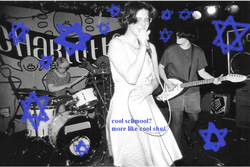Decidedly Unorthodox
Earlier this year, it was a Saturday afternoon and I was at my friend’s house when she asked me how my beliefs in feminism and Modern Orthodoxy were compatible. I tried to explain to her that in order for my feminism to be real, it had to be challenged. Growing up in a Modern Orthodox community, I was taught that a man’s place in Judaism is more important than a woman’s. I had to wear skirts because my body might distract my male classmates from their learning. I wasn’t allowed to participate in services because my voice might distract men from their praying. All these are things I came to reject as I started identifying as a feminist. When I attempted to explain this to my friend, she said, “you must not be Orthodox then,” and I believed her. I believed that my feminist and Modern Orthodox beliefs were irreconcilable. I accepted the fact that I had to distance myself from the Orthodox community because of its inherent sexism. Women are not equal to men in Modern Orthodoxy, and therefore I had to go.
I don’t think I handled that encounter well. I should have stood up for my beliefs, confused though they may have been. But six months later, I had a chance to revise it. I was talking to some friends about how I struggle with labels in Judaism, and one friend commented offhandedly that obviously I wasn’t Orthodox. I paused, took a deep breath and said: “Okay, taking this away from Judaism and this conversation, no person has the right to tell another person how to label themselves. It is a personal decision how I choose to identify, and on any level of basic respect you cannot tell me who I am.” My friend looked taken aback and apologized, but then added “Well, at least you’re not my kind of Modern Orthodox,” implying that the Judaism I live is somehow less religious than her’s. She implied that because of my progressive views, my relationship with God is less real than her’s is, thus suggesting that somehow my Judaism is different because of my feminism.
After my rejection of Orthodoxy earlier this year I started identifying as Egalitarian. Halachic Egalitarianism is a brand of Judaism in which men and women are treated as complete equals. Women are considered obligated in all the commandments that men are, there is no barrier separating the sexes during prayer, and women are allowed full participation in all services. I love the unquestionable equality that Egalitarianism offers but something wasn’t quite working for me. As the year progressed I realized that I was missing the daily struggle I faced in Orthodoxy. I missed grappling every day with what my place is and how I can fight for my rights and find a role. I found that my Orthodox friends no longer considered my opinions valid and I felt like a stranger in the community I’d lived in all my life.
I realized that I often feel like I have to prove my commitment to Judaism. I am very vocal about my views on feminism, my serious consideration of biblical criticism, my doubt in God, my objection to modesty, and more. Because of this, people view me differently. When in conversation with other Orthodox Jews, I often find myself quietly confirming my commitment to halakah (Jewish law). I slip in that the restaurant was kosher, that it was after Shabbos, that my skirt wasn’t mini… yet my Judaism isn’t something I should have to defend. If I believe that what I’m doing is right, why should I be ashamed of it?
This past year, I tried really hard to label myself. I took a very large step away from the label of Modern Orthodox and tried out Egalitarian. Whenever I meet someone I’m really curious as to how he/she labels him/herself. Is s/he a feminist? How about a democrat? But labels are degrading because they reduce my constantly evolving Judaism into something simple. My Judaism isn’t static; it is growing and changing me every single day. Right now I am an observant, progressive, highly affiliated, and feminist Jewish girl. If I want, I can be a Modern Orthodox Jew. If I don’t want to, I don’t have to. But my identity is up to me, not to those around me. I don’t know exactly where I am going to take my place in the Jewish community, but I know that wherever it is, I’m here to stay.
This piece was written as part of JWA’s Rising Voices Fellowship.








Believe what you want, practice what you want. G0d gives you free will. But I'm sorry to have to tell you that "Halachic Egalitarianism" is an oxymoron. It it's egalitarian, it's not halachic. Period. No matter how much of an intellectual pretzel you twist the rhetoric into.
In reply to <p>Believe what you want, by rob
Halachic Egalitarianism is the ideal. God expects women to participate in Jewish life alongside men. He never condones sexism or racism or any other kind of discrimination. If men must study and follow the Torah, then so must women. After all, God is neither male nor female (Genesis 1:26-27; Genesis 5:1-2).